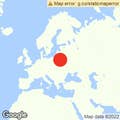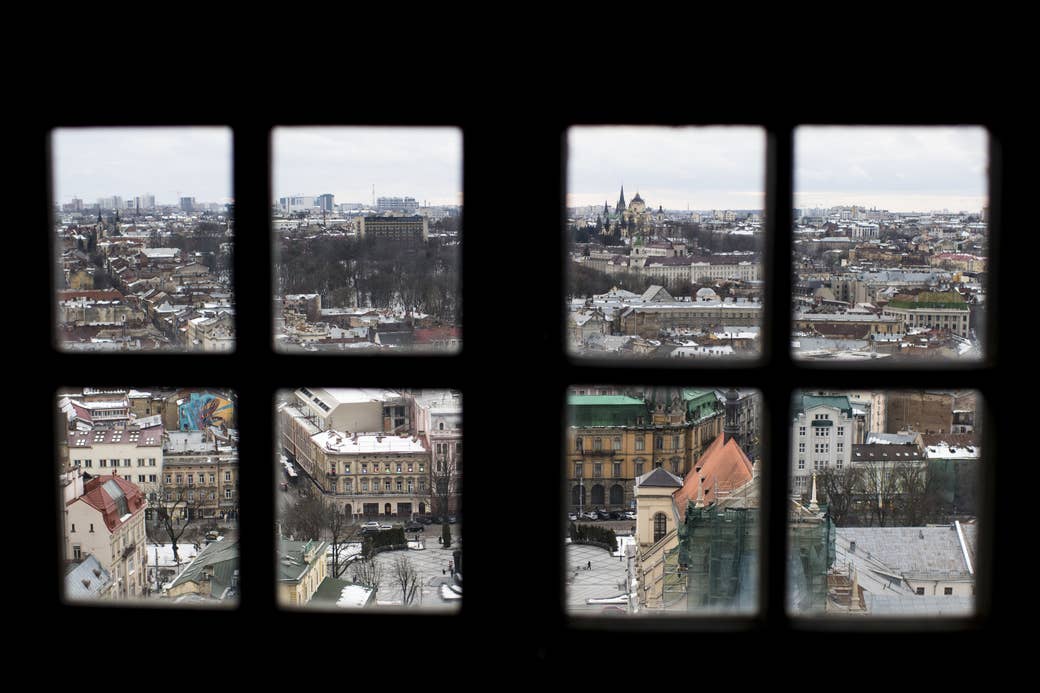
LVIV, Ukraine — As Russian soldiers and heavy weapons nearly surround Ukraine, raising the specter of a potentially devastating invasion, some Ukrainians are beginning to seek out a safe haven in the country’s western regions. Here, there are shared borders with NATO members, US troops nearby, and roads leading to the European Union in the event of an evacuation — not to mention a long history of locals resisting Russia’s rule.
And it’s not only residents — several companies are, as well. And the US Embassy in Kyiv is also looking to western Ukraine as it considers contingency plans for a possible Russian attack, BuzzFeed News has learned. While the embassy has not made any decisions on the matter, relocation to someplace in western Ukraine is actively being discussed, according to a source with knowledge of the talks.
Asked for comment, a State Department spokesperson told BuzzFeed News, “We have nothing to announce at this time.” The US Embassy in Kyiv remains open for most consular services, the spokesperson said, adding, “As we continue to advise, US citizens in Ukraine should consider departing now, using commercial or other privately available transportation options.”
Hours later, President Joe Biden urged US citizens to leave Ukraine immediately. "I think it would be wise to leave the country," Biden said during a news conference with German Chancellor Olaf Schulz. "I'm not talking about our diplomatic corps. I'm talking about the Americans there. I don't want them to get caught in the crossfire."
Some people and businesses are reaching out to Zhanna Shevchenko, a public relations consultant who splits her time between Lviv and Kyiv. She posted on Facebook last month that she was helping friends and relatives find temporary housing in Lviv, a stronghold of Ukrainian culture and nationalism with some 720,000 residents. Requests for assistance came pouring in.
A friend in Kyiv asked for a house outside Lviv and an apartment in the city for himself and his extended family. Another friend from Melitopol, Shevchenko’s home city in southeastern Ukraine, also wanted help finding an apartment in Lviv’s center. And an IT company in Kharkiv — whose owners didn’t want it to be named over concerns about its reputation — asked her to help find lodging for its dozens of employees and their families. Shevchenko managed to secure an agreement for 100 rooms for 200 people at the Lviv Hotel.
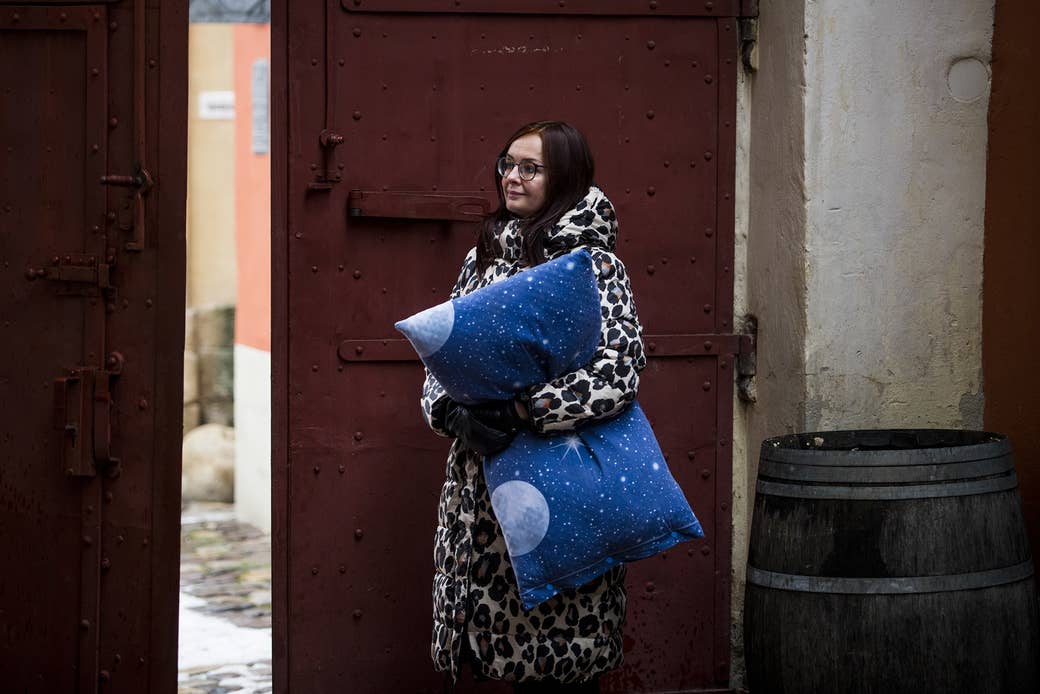
“People are interested in renting for a few months, but maybe longer,” Shevchenko told BuzzFeed News in Lviv’s historic city center, just 50 miles from the Poland border, where US airborne troops arrived on Sunday. “We are near the NATO border. This is something very important for people.”
Andriy Sadoviy, the longtime mayor of Lviv, told BuzzFeed News that his city was ready to welcome those seeking safety and shelter. He conceded, however, that the city didn’t have the capacity to house the hundreds of thousands of people who would be displaced in the event of a full-scale Russian attack.
“We don’t have free space and residences available for everyone,” he said. “But my family would be ready to accept another family. If every family in Lviv receives another family, it will be a great help.”
Sadoviy said the Russian threat is at a “red level.” He has ordered Lviv’s hospitals to be ready to receive an influx of wounded people if an invasion comes, and he encouraged residents to join the area’s territorial defense force, one of many that have sprung up across Ukraine.
“You’d have to be stupid not to understand the danger we face,” the mayor said. “If you have 120,000 Russian troops standing at your door, what does it mean? Are they engaged in charity work? No. They want to take Ukraine.”
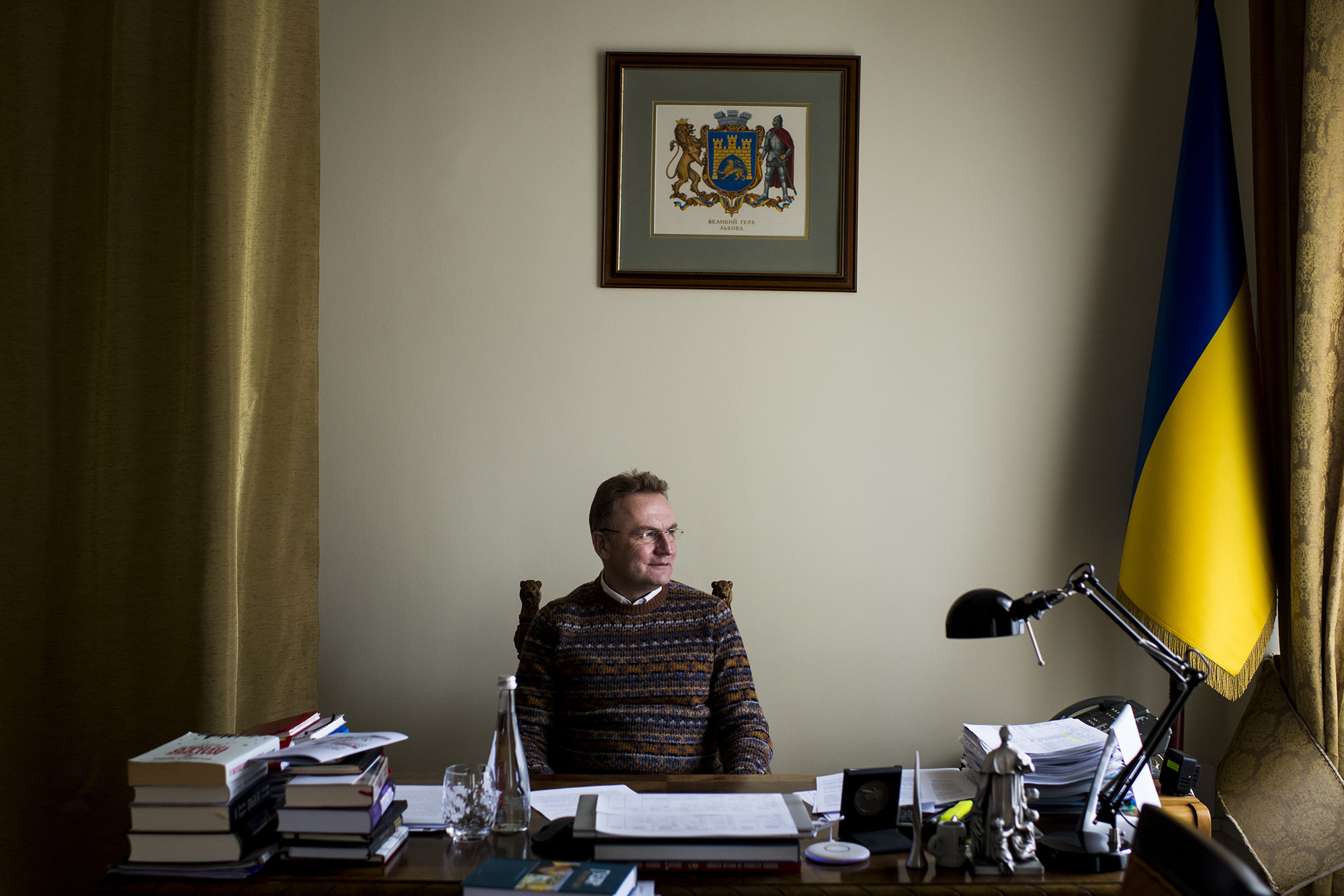
The country, roughly the size of Texas and home to some 40 million people, sits uncomfortably beside Russia, its former imperial ruler. Russia seized Ukraine’s Crimea in 2014 and has transformed the southern peninsula into what’s being called “one large military base.” Moscow’s capture of the territory has also led to a buildup of naval forces, making the Black Sea and the nearby Sea of Azov hostile territory. On top of that, Russian President Vladimir Putin is stacking up forces in the east, where Russia fomented a war eight years ago and still controls a large swath of the Donetsk and Luhansk regions, and to the north in Belarus, an ally that shares a 670-mile border with Ukraine. The shortest distance from there to Kyiv is a mere 100 miles.
But the west of Ukraine is bordered by allies, and NATO and it doesn’t provide Russia an easy strategic invasion.
President Joe Biden ordered 1,700 soldiers to be deployed to Poland to reassure allies in Eastern Europe. White House national security adviser Jake Sullivan has said during appearances on Sunday talk shows that Putin could order an attack on Ukraine “any day,” resulting in an “enormous human cost.”
His remarks followed reports that senior Biden administration officials had briefed lawmakers that a full-scale Russian invasion could kill and wound up to 50,000 civilians, overthrow the central government in Kyiv, and spark a humanitarian crisis with around 5 million refugees. White House officials reportedly said Moscow has already assembled 70% of the military firepower that it wants around Ukraine.
For its part, the Kremlin has denied planning to invade Ukraine again.
But US forces won’t be stepping foot in Ukraine if Russian troops roll in. And a contingent of US military trainers currently based at Ukraine’s Yavoriv International Peacekeeping and Security Center would not go into combat mode, either. Biden has said that US boots on the ground in Ukraine is not an option.
On Feb. 4, BuzzFeed News observed members of the Florida National Guard training Ukrainian troops on American-made M141 “bunker busters,” single-shot, shoulder-launched weapons meant to destroy fortifications. On a snowy field just 15 miles from the Polish border, Ukrainian troops took turns acting out a scenario in which they had to stop a Russian advance. Armored personnel carriers delivered the soldiers to a position dozens of yards away from their enemy. They jumped down, prepared their rocket, and then fired, blowing up piles of tires that flew through the air.
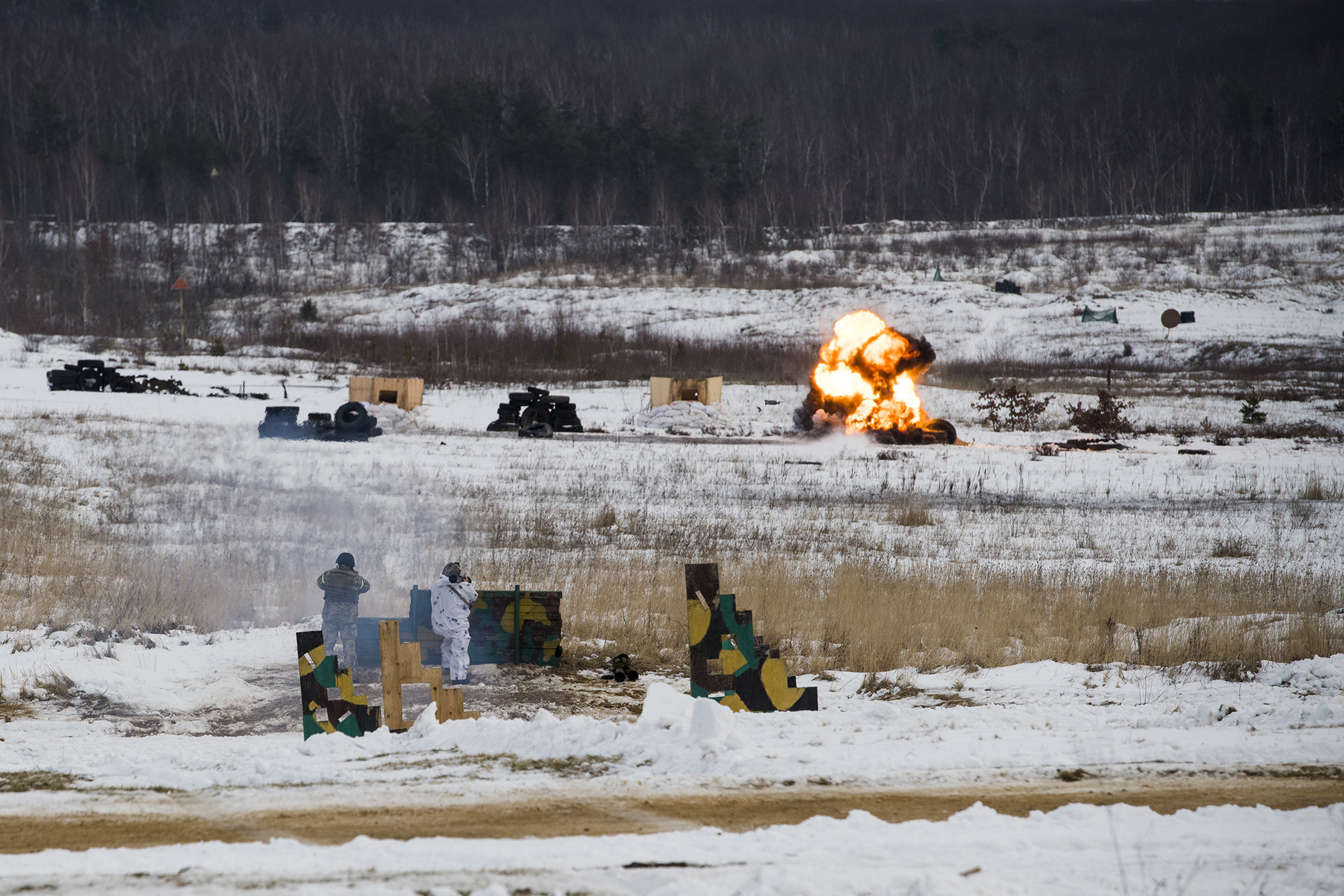
Similar training sessions have been held since 2014 as a way of helping strengthen Ukraine’s military so it can better defend itself from Russia. Col. Andriy Bestyuk, deputy head of the training department of the General Staff of the Armed Forces of Ukraine, told BuzzFeed News in Yavoriv that his military is now a force capable of significantly counteracting Russia for any attempted invasion. That said, Ukraine’s modernized army would likely be routed if faced with a large-scale attack by Russia’s significantly more sizable and powerful military.
Back in Lviv, the mere presence of those US forces put Veronika Mironova at ease as she sipped a Guinness. She knows all too well about the devastation that Russia’s military aggression can cause. She was a journalist in the eastern city of Donetsk in 2014, when Russian soldiers and special forces, along with their pro-Moscow separatist proxies, seized government buildings in her city and in neighboring Luhansk and sparked an armed conflict. The war has lasted nearly eight years, killed more than 14,000 people, and displaced nearly 1 million other people like herself.
Seeking safe haven far from the tanks and missiles pounding Donetsk, she fled with her family to western Ukraine, but only after heavy fighting had already begun.
Until the artillery fire began, “nobody believed it would happen,” Mironova said, recalling the sense of denial that people lived in. “People thought that nothing bad would happen. Then they thought it would last just a few weeks. People were sitting in Donetsk until the last minute. They didn’t want to leave.”
Escaping the fighting as it was happening was difficult and risky, she added.
Some people have learned from the events of 2014. “Now they try to prepare before something will happen,” Mironova said.
Tetiana Ivanchikova, a Melitopol resident whose son serves in Ukraine’s military, is one of them. She told BuzzFeed News that she wants to relocate her family to Lviv because it’s “a safe place and a city close to Europe.”
“We live 200 kilometers from the Donbas and 100 kilometers from Crimea,” she said. “Therefore, the danger level is very high.”
Also among them are at least three companies that do international business. Two based in Kyiv and one from Kharkiv confirmed they have either already secured or are seeking preagreement for housing and workspace in western Ukraine. Besides Lviv, the companies, all of which asked not to be named out of concern for employees and their families, are considering the nearby cities of Ivano-Frankivsk, Ternopil, and Uzhhorod.
“It could be difficult to perform their duties while under siege,” one of the company’s executives said. “As tech companies, we can offer services remotely.”
The cobblestoned streets of Lviv can feel like they're a world away from the war zone in the east. Unlike Kharkiv, near the Russian border, which Ukrainian President Volodymyr Zelensky conceded is a likely target that could be captured in days, and the capital of Kyiv, home to the central government, there has been little, if any, news about this western region being targeted.
Yet, if Russian forces are to attack anywhere, Sadoviy said, the pain would resonate to the west.
“Ukraine is like a body,” he said. “When your hand is cut off, your whole body aches.” ●

